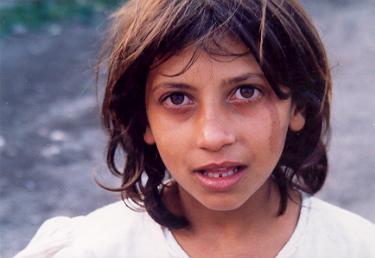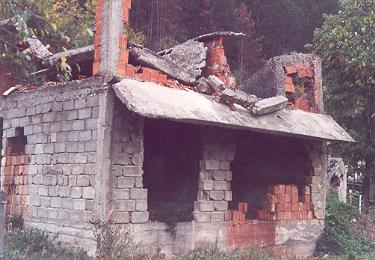Council of Europe Anti-Racism Commission Issues First Report on Bosnia and Herzegovina
21 July 2005
On February 15, 2004, the European Commission against Racism and Intolerance (ECRI) made public its first report on Bosnia and Herzegovina under its country-by-country analysis of racism and intolerance in each of the member states of the Council of Europe. ECRI noted in its report that the situation of Roma/Gypsies in Bosnia and Herzegovina is of particular concern noting that the already difficult economic situation of the country is further compounded by "prejudice and discrimination both at societal level and by public authorities. The disadvantaged position of Roma is evident across all fields of life". ECRI further noted:
"60. An aspect that is of particular concern to ECRI, as it affects the enjoyment of many rights by Roma, including fundamental human rights, is Roma's lack of personal documents. […] The fact that many Roma live in informal settlements, whose residents are not registered with the local authorities, has an obviously negative impact on the possibility for the Roma to obtain at least some of these documents. […] ECRI emphasises that, given the health and economic situation of the Roma population at present, it is particularly important to ensure that the Roma possess the necessary documentation to enable them to access health services and social benefits.
 Mirnela Suvalic, at the time an 8-year-old Romani girl in Banlozi, Bosnia, August 2003. Romani families in Banlozi live in the vicinity of a camp for Bosniak internally displaced persons. A German non-governmental organisation reportedly organised workshops for children on the camp?s premises in spring 2003, and the activities were apparently open to all children. Nevertheless, according to statements by Romani parents provided to the ERRC in August 2003, the non-Romani parents objected to attendance by Romani children. Ms. Suvalic was one of the Romani girls attending the workshops, but when her father heard of the attitude of non-Romani parents, and that non-Romani children beat Romani children, he decided that he would no longer allow his daughter to attend.
Mirnela Suvalic, at the time an 8-year-old Romani girl in Banlozi, Bosnia, August 2003. Romani families in Banlozi live in the vicinity of a camp for Bosniak internally displaced persons. A German non-governmental organisation reportedly organised workshops for children on the camp?s premises in spring 2003, and the activities were apparently open to all children. Nevertheless, according to statements by Romani parents provided to the ERRC in August 2003, the non-Romani parents objected to attendance by Romani children. Ms. Suvalic was one of the Romani girls attending the workshops, but when her father heard of the attitude of non-Romani parents, and that non-Romani children beat Romani children, he decided that he would no longer allow his daughter to attend.
"61. Roma are reported to have experienced serious difficulties and discrimination in exercising property rights and, therefore, their right to return to their pre-war homes. It has been reported to ECRI that, since many Roma lived in social housing before the war, this group of persons has been particularly negatively affected by the fact that property laws passed after the war do not recognise in principle social housing as a form of tenure to which one might claim repossession rights. Furthermore, many of the Roma who used to live in informal settlements before the war have been unable to return there, as such settlements had been destroyed and no alternative provision of accommodation has been made. Those Roma who could claim repossession of personal property are also reported to have experienced serious difficulties and, often, discrimination by the authorities and by other citizens. There are reports, for instance, that local authorities have often obstructed Roma repossession claims on grounds that temporary occupants of their property had nowhere to go. In cases where Roma were successful in establishing their claims, the authorities have often reportedly been slow in removing occupants and, in some cases, Roma have had to pay temporary occupants in order to have them leave their property. Temporary occupants are also reported to have looted or vandalised Roma property before leaving, without the authorities taking action to punish the perpetrators. ECRI urges the authorities of Bosnia and Herzegovina to make all local authorities aware of the illegal nature of these practices and to ensure that acts of damage to Roma property are investigated and their perpetrators brought to justice."
 The village of Kozluk is located not far from the town of Zepa, in the eastern part of Republika Srpska. Most people who live in the village are ethnic Serbs. Before the war, some fifty Romani families lived in Kozluk. After the war however, only fifteen remain. The houses in which the remaining Roma live are badly damaged and there are many buildings that are completely ruined, which presumably belong to the thirty-five Romani families that fled during the war. A man who would only call himself ?Sevkija? told the ERRC: ?When the war broke out, the Serbian army came here and picked up all the men from the village and took them to Kiseljacki put. This was the front line back in those days. Roma did not choose to join the Serbs, they were forced to. When they were dragged onto the trucks, it was like they were slaves. We heard that one of our boys committed suicide when he arrived at the front.? Mr Bajro Hidanovic further told the ERRC, ?I was forced to join the Serbian army. It was the worst experience I have ever been through. One of my superior officers kept on telling the other Roma and myself in the battalion that we were more animals than men. The Serbian soldiers often took the opportunity to beat me although I was in their army. [?] Once I actually lost consciousness after a punch in my face. Another time they threw me into a pond of ice-cold water and prevented me from getting out of the water.? During the course of field investigation, the ERRC also received numerous accounts concerning Roma who had ?disappeared? during the war. Mr Sevko Beganovic, a Romani man from Kozluk, stated, ?Some Roma just disappeared. [?] Emina Suljic was one of the young women from Kozluk who were taken by the Serbs. We heard they used her as a prostitute. I guess they raped her and kept her for fun. Then she disappeared. Nobody really knows what happened to her. Clearly she died, but when, how and where is unknown.? Romani activists in other parts of Bosnia and Herzegovina also confirmed instances of rape of Romani women in the 1992-1995 war. Women victims of rape reportedly live today under particularly harsh circumstances, as they are frequently rejected by the Romani community and also ignored by the local authorities.
The village of Kozluk is located not far from the town of Zepa, in the eastern part of Republika Srpska. Most people who live in the village are ethnic Serbs. Before the war, some fifty Romani families lived in Kozluk. After the war however, only fifteen remain. The houses in which the remaining Roma live are badly damaged and there are many buildings that are completely ruined, which presumably belong to the thirty-five Romani families that fled during the war. A man who would only call himself ?Sevkija? told the ERRC: ?When the war broke out, the Serbian army came here and picked up all the men from the village and took them to Kiseljacki put. This was the front line back in those days. Roma did not choose to join the Serbs, they were forced to. When they were dragged onto the trucks, it was like they were slaves. We heard that one of our boys committed suicide when he arrived at the front.? Mr Bajro Hidanovic further told the ERRC, ?I was forced to join the Serbian army. It was the worst experience I have ever been through. One of my superior officers kept on telling the other Roma and myself in the battalion that we were more animals than men. The Serbian soldiers often took the opportunity to beat me although I was in their army. [?] Once I actually lost consciousness after a punch in my face. Another time they threw me into a pond of ice-cold water and prevented me from getting out of the water.? During the course of field investigation, the ERRC also received numerous accounts concerning Roma who had ?disappeared? during the war. Mr Sevko Beganovic, a Romani man from Kozluk, stated, ?Some Roma just disappeared. [?] Emina Suljic was one of the young women from Kozluk who were taken by the Serbs. We heard they used her as a prostitute. I guess they raped her and kept her for fun. Then she disappeared. Nobody really knows what happened to her. Clearly she died, but when, how and where is unknown.? Romani activists in other parts of Bosnia and Herzegovina also confirmed instances of rape of Romani women in the 1992-1995 war. Women victims of rape reportedly live today under particularly harsh circumstances, as they are frequently rejected by the Romani community and also ignored by the local authorities.
ECRI also reported extensively on several other issues including: inhuman living conditions, verbal and physical abuse by non-state actors, low labour market participation rates, conflict with law enforcement officials and the low educational participation rate of Romani children. To view the full text of the ECRI report and its recommendations visit the Council of Europe’s website at: http://www.coe.int/T/E/human_rights/Ecri/1-ECRI/. Further information on the situation of Roma in Bosnia can be found in the ERRC country report “The Non-Constituents: Rights Deprivation of Roma in Post-Genocide Bosnia and Herzegovina" on the ERRC website at http://www.errc.org/uploads/upload_en/file/00/28/m00000028.pdf.
(ERRC)




